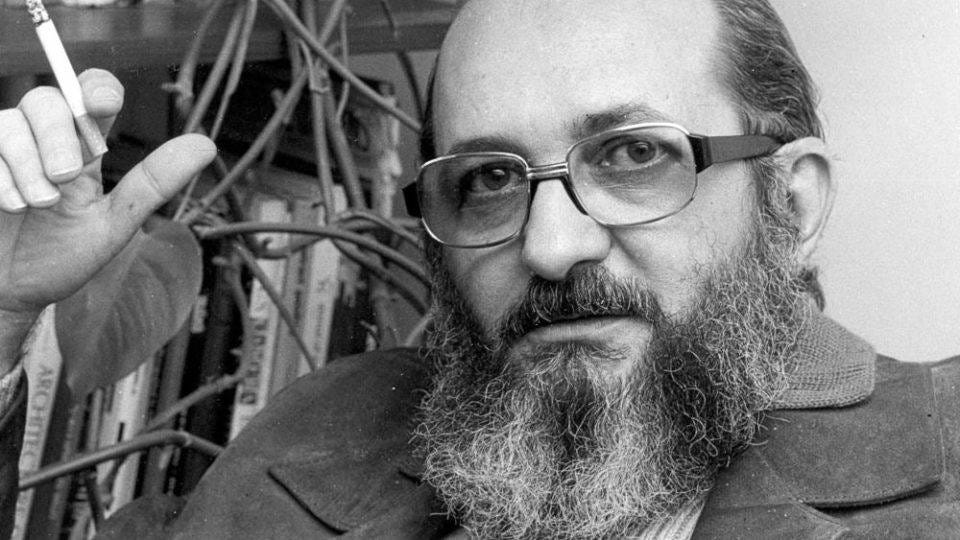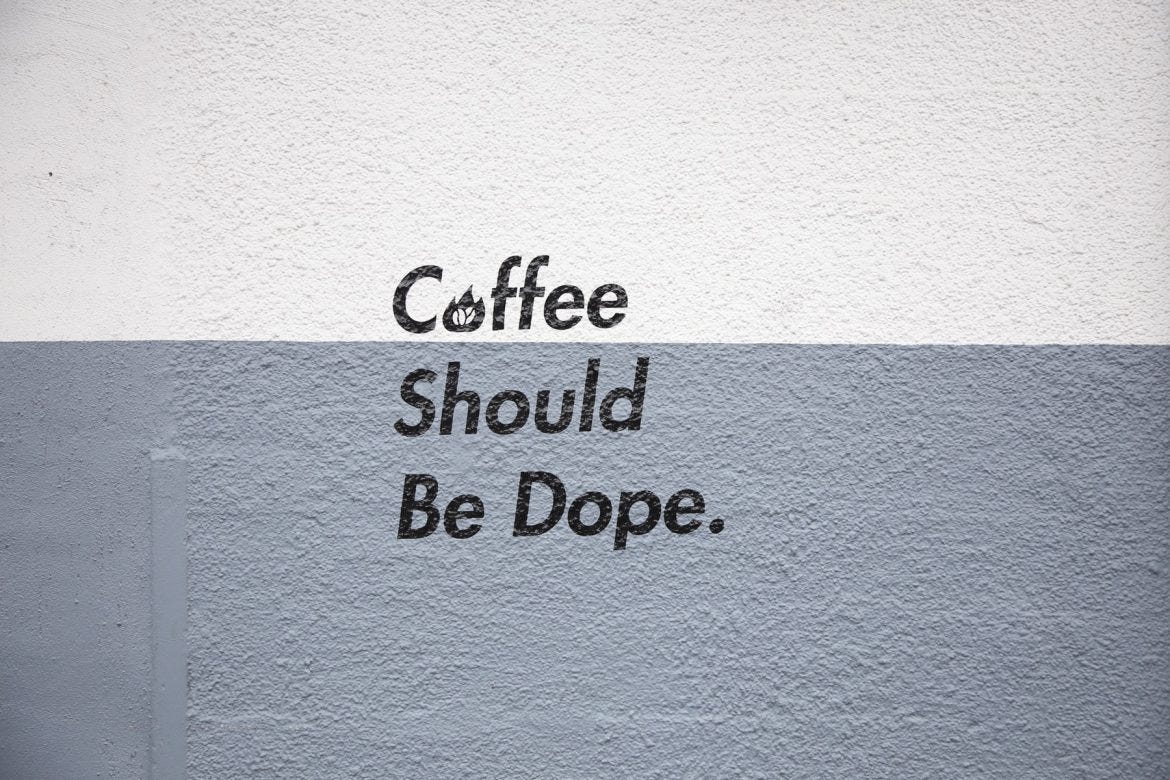On attention-seeking behavior and using one's platform
An old family indictment as a bulletproof approach to political change in one’s pursuits. That includes, yes, coffee.
Scrambling around the tremendous gangplank-looking dinner table at my nonni’s farmhouse, I grab one of my cousins to tell them some Jim Carrey-ripped joke, do some wacky impression I’d been preparing just for Sunday family dinner. If my shit was not funny, they might look down their noses and say: “You’re just trying to get attention.” Devastation. I would not only fail to make my family laugh, but they’d pull a Bicchieri classic: hack the tree at that one root, the one poking over the dirt looking tender.
This is not a family takedown, though. It’s this specific line, “you’re just trying to get attention,” that stuck with me for years. It didn’t come from my cousins or siblings; like lots of kids, they took this hammer right from the parents’ toolbox. It’s hung around like a poltergeist all my life. I remember first hearing it around six years old and I’m now rounding out 30. As I get older, I consider attention-seeking in a far more specific, emergent sense.
Take the term at its base level. The American Psychiatric Association, the somewhat contested organization behind the much-quoted Diagnostic and Statistical Manual of Mental Disorders (DSM), defined the term not for the first time in 2013 as "engaging in behavior designed to attract notice and to make oneself the focus of others' attention and admiration.” But in 2021 Scientific Research Publishing ran an article on “the myth” of attention-seeking behavior. The paper argues “people do not want attention, rather they want the things attention brings, such as safety, affection, acceptance and other needs.” This research looked at those with autism spectrum disorder, but the takeaways blanket for many who use attention-seeking behavior as a tool to secure what Australian researcher Bob Bowen refers to as the matrix of needs. Top of that pyramid is interdependent actualization.
I credit attention-seeking behavior as one of my main unconscious coping mechanisms in reaching that summit. It’s the B plot as to why I fixate on things like longboard surfing, the Seattle Supersonics power couple of Payton and Kemp, and coffee economics. But as I sought out adoration and praise from my family, friends, and, as I got older, bosses and professors and community leaders, I learned, slow and sure, this approach was not going to care for all that tender branching. I had to do something with all that attention-seeking.
And there are lots of things to say about seeking attention, lots that could be discussed in regards to social media and personality disorders. I can’t speak to a lot of that. But, as a needy person who managed to get published, I am saying here that when a person accesses an audience to deliver a message, it’s critical to understand why and how to use that time for the betterment of the writer or speaker and reader or audience.
Take a recent example from how I spend a good deal of time: researching coffee. In the Ologies podcast, Peter Giuliano, the Specialty Coffee Association’s chief research officer, spent an hour and a half walking through the coffee world. I enjoyed his warmth, levity, and personability. I think conversations like these can help bring people into something as dry as commodity production and ethics.
But, to that latter point, Giuliano side-stepped key issues facing the industry. Around minute 50, he deflected listener questions regarding sourcing and shade-grown coffee. On how to shop for well-sourced coffees, he demurred, making sure to point out big companies are "following up on their commitments” to sustainability. Anyone paying even remote attention to coffee, or big business anywhere, knows this is not true. It was a doublespeak answer, and I hate doublespeak.
Maybe worse, he notes small companies invested in the supply chain are “interesting," painting scalability as a non-issue to listeners, before framing shade-grown and mass production as two equally viable approaches. He shrugs, indicating shade grown is subjective. Sure it is, but it’s also widely considered paramount to protecting coffee from the worst of climate change and stewarding the industry toward salvation.
But, in a dope twist, Giuliano also highlighted California’s Pachamama. It’s a cooperative coffee business from origin to consumption and one I have highlighted numerous times, in profile and in gift guides. While I wish he’d gone further in his own attention-seeking behavior — You’re on a podcast! Use your platform! — I recognize the limitations of his roles. Which is exactly why I don’t like politicians, industry or otherwise.
Finishing this podcast, I was full of self-righteous vigor, percolating with thought. It reminded me of other coffee gorgon knots I’d been chewing on over the summer: Sightglass founders selling out to Starbucks and Red Bay filing for bankruptcy while the founder draws $180,000 in annual salary to name two. I wanted to write.
I paused, asked myself if I was just seeking attention. Then I thought again: What is the objective of writing if not seeking attention?
Stephen King says writing is telepathy, James Baldwin says you have to endure writing as it grips the writer until it is through. Media corruption, unethical framing, and semiotics underscores much barroom conversation in the early 21st century, often boiled down to muttering “media literacy” and shrugging by closet Joe Rogan listeners and The Daily silent majority types. The aim of this medium of distribution should be much like the debunking of attention-seeking in that paper: not for its own sake, but to achieve actualization, meet needs of not just the writer but a collective, a city, a community.
If I believe the time I’ve been given, in concert with the skills God granted me, should be used well, then I am hoping to not just seek attention but demand attention, capture attention, and move it to the correct causes and movements.
I get inspired to keep at it when I catalogue examples of folks moving the needle through their writing, another form of data collection. Writing organization When the Smoke Comes in the Bay Area is doing much of this lately, teaching classes on writing at cafes and raising money for Oakland initiatives supporting poor people. Poet and activist Darius Simpson took his three minutes at a Poets for Harris event to take the top cop to task for her support of the Palestinian genocide. Even fucking Macklemore is writing bars, in collaboration with Arab American rappers, to raise money for UNRWA USA.
Seeking attention is indeed a pathway toward interdependent autonomy. Since my expertise lies in coffee, rather than Middle Eastern conflict, I’ll agitate where I can. Rappers like Mick Jenkins put out meticulously researched projects like the Waters to dissect resource allocation to Black Americans; educator and writer Paulo Freire pushed a praxis-based approach (which I will write on in greater detail another time) to the next level.
I am tired of noiseless self-serving just as I am tired of online rage addiction. Now I want to write clearly and calmly what I mean on the topics I can speak to and invite discourse, and progress, on those things. So too should anyone, whether their takes are on coffee, restaurant workers, basketball politics, bombs flying over oceans.
That is indeed seeking attention, and what I want to do with this Substack. I had the idea for this forum while on a jog and the name made me laugh. That old haunting is more funny to me now than damning. Whether people think Jenkins or Freire or any other writer’s words are important is their own prerogative. I’m in it to access that actualization for those that I can, including myself. Six-year-old me would be glowing.







